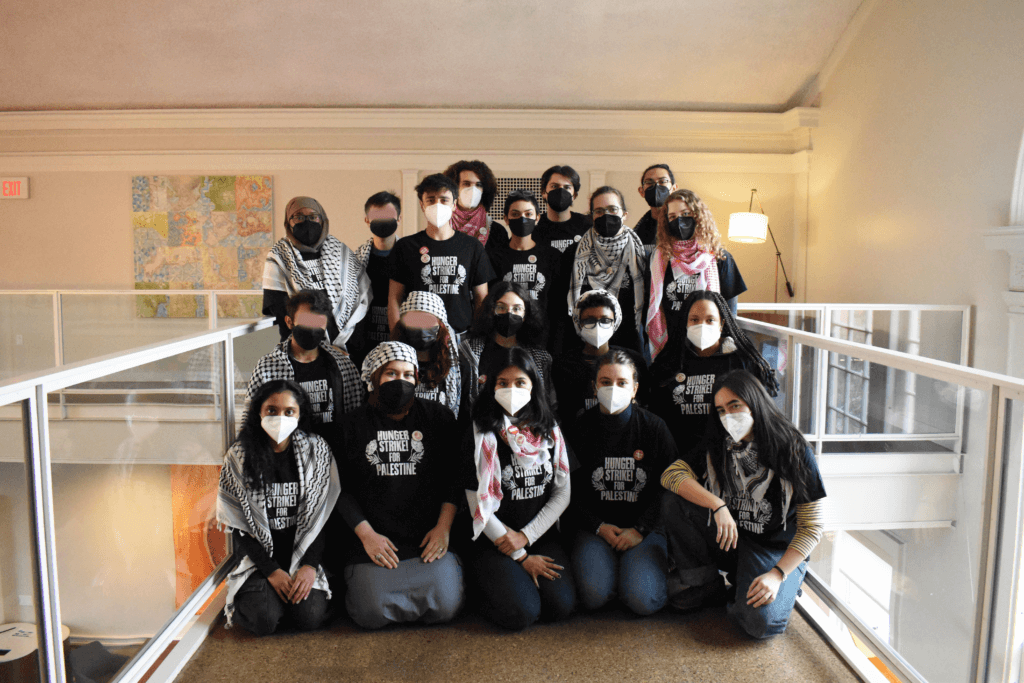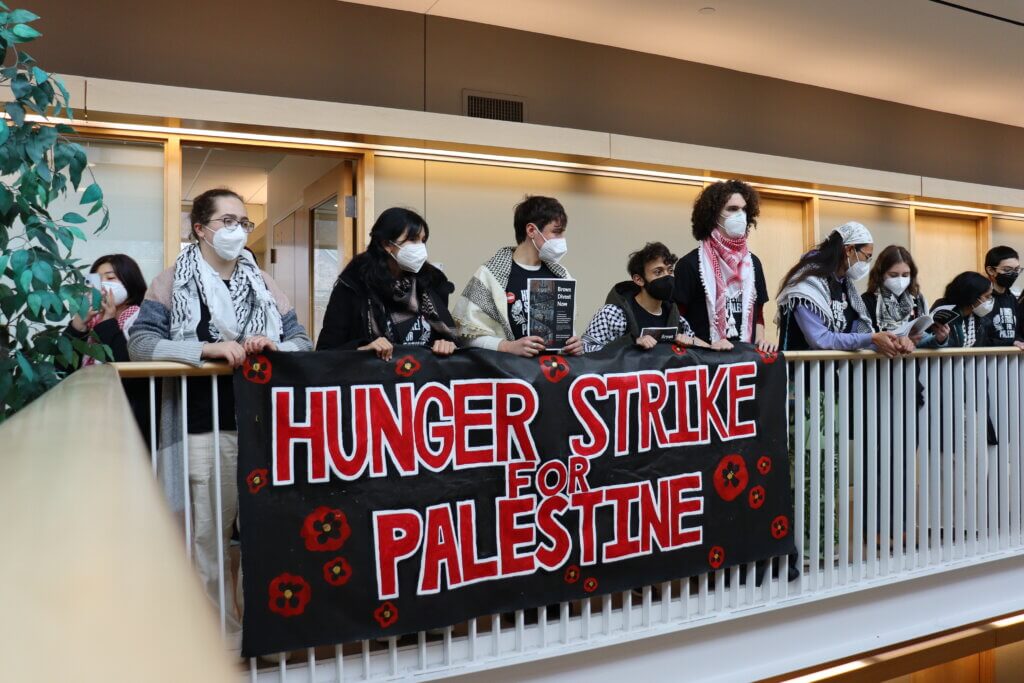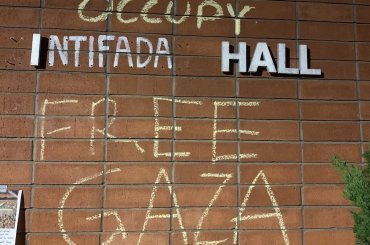A Palestinian- and Jewish-led group of 17 students refused food for 172 hours to call attention to Brown University’s complicity in Israel’s occupation of Palestine. It was the longest hunger strike for Palestine in the U.S. since Israel’s bombing of Gaza began last October. As students who were part of organizing the hunger strike that ended on February 9, we are committed to continuing to pressure Brown University’s board, unconvinced by their claims of neutrality while they finance genocide and occupation.
It is shameful that Brown’s leaders chose to ignore our demands to seriously consider a proposal to divest from companies that enable Israel’s killing of nearly 30,000 people in Gaza. Members of the governing body avoided eye contact as they walked past students who had not eaten in eight days, but they couldn’t avoid the widespread international press attention that the hunger strikers accumulated, or the hundreds of peers inspired to attend rallies, or the over 200 students, faculty, and staff who joined the strikers in a 32-hour solidarity fast.
We only chose to organize a hunger strike after exhausting nearly every other institutional channel and possible civil disobedience strategy. We have won super-majority referendums, passed resolutions through our university’s investment watchdog, and engaged in endless meetings with administrators. When 20 Jewish students held a sit-in for divestment and a ceasefire in November 2023, Brown chose to arrest them. Only after Hisham Awartani, a Palestinian student at Brown, and his two friends were hatefully shot later that month simply for wearing keffiyehs and talking in Arabic, did the university drop the charges against the arrested students. But weeks later, Brown arrested 41 students for a second sit-in, demanding that the university “Divest for Hisham.” The charges against the second group remain.

The hunger strikers follow a rich tradition of anti-apartheid mobilizing. In March 1986, four Brown University students refused to eat for ten days in protest against the university’s investments in apartheid South Africa. Although these strikers also ended their strike without their immediate demands being met, their actions, along with others who went on hunger strikes at Columbia, Rutgers, Williams, and more, were an important part of a movement that created international scrutiny and condemnation that helped to collapse apartheid South Africa.
Students across the U.S. undertook hunger strikes to protest the Vietnam War. From the 1960s to the ’90s, student hunger strikes succeeded in creating and protecting universities’ ethnic and Black studies programs. More recently, hunger strikes at dozens of colleges built effective campaigns for divestment from fossil fuels and strengthened labor policies for students, graduate workers, and staff.
Universities are deeply wary of immediately giving in to the demands of student hunger strikers. Nonetheless, the moral clarity created by students’ self-sacrifice has the power to shake institutions. Hunger strikes are a critical part of what creates the conditions for campaigns to be successful – in no small part because they build movements.
On each day of Brown’s Hunger Strike for Palestine, hundreds of students, graduate workers, staff, and faculty showed up in solidarity at the strikers’ Campus Center. We chose to miss classes to organize, join rallies, screen print t-shirts, participate in teach-ins, and make protest music and art. Ours is a movement that will continue to fight for divestment for however long it takes to end our university’s complicity in the bombing, starvation, and ethnic cleansing of 2.3 million Palestinians.
While all of us draw on the rich tradition of hunger strikes on college campuses, the action had distinct resonance for the four hunger strikers who are Palestinian. One reflected: “Living under the occupation, I’ve known people who have been on hunger strikes for months [in] Israeli prisons in which they were unlawfully detained. I’m learning from them [and] learning from a long line of people who have been resistant to occupation.”
In a historic vote on February 16, students at UC Davis passed a bill that will divest the student government’s $20 million budget from companies that enable Israeli occupation. Aside from this, not a single U.S. college has fully divested from companies profiting from what Amnesty International, Human Rights Watch, and other respected organizations agree is a racist system of oppression that amounts to apartheid. But there was a time, too, when not a single American university had fully divested from companies profiting from South African apartheid. Hunger strikes have led to divestment from systems of apartheid before, and they’ll do it again.
The hunger strike at Brown is just one small piece of a struggle that requires participation by our friends and peers at other colleges and solidarity from justice-minded people everywhere. To those who dismiss student activism as performative or naive, we note that young people have always been at the forefront of action against injustice. For boomers, it was the Vietnam War. For Gen X, apartheid South Africa. For millennials, Iraq and Afghanistan. History has proven that institutions might withstand our pressure in the short term, but ultimately, they will concede to our unwavering demands for justice. Our generation’s defining political moment is Israel’s genocide in Gaza, and we will make our mark.
Maru Attwood, Sam Stewart, and Eli Grossman are members of the Brown Divest Coalition and BrownU Jews for Ceasefire Now.



I’m hoping the former hunger strikes—but really, all those aspiring to support Palestine at elite U.S. universities—will consider that these educational institutions, built on centuries of chattel slavery & continued expropriation of lands inhabited by a wide range of indigenous peoples, should be disbanded & destroyed. They are incapable of “doing the right thing”.
Some further reflections to engage with can be found in “10 Anarchist Theses on Palestine Solidarity in the United States”.
https://haters.noblogs.org/post/2023/10/26/10-anarchist-theses-on-palestine-solidarity-in-the-united-states/